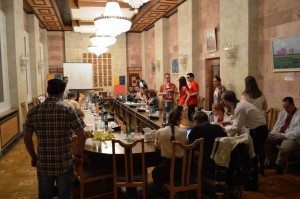Special for the Armenian Weekly
I’ve reached the halfway mark of this six-part series chronicling the work of environmental organizations in Armenia. Working for the Armenian Environmental Network, an organization that works to facilitate partnerships between Armenia and the diaspora in the U.S., my goal for the series was to write about the people and places in the environmental field that you perhaps haven’t heard of before. The more knowledge the diaspora has about the work taking place in Armenia, the more opportunity there is for collaboration to confront the environmental challenges Armenia faces. One of these organizations ready to collaborate internationally is the Young Biologists Association (YBA).

I sat down with Arsen Gasparyan, YBA’s president and founder, to learn about the organization and its current projects. It has taken passionate people like him to develop a thriving organization in just 5 years, which now boasts almost 200 members, including students, researchers, and professors. The diverse group of members comes together to implement projects in biology and nature conservation, which range from organizing biological conferences and trash clean-up initiatives, to running environmental summer camps for kids.
Gasparyan is proud of the way YBA operates. They aren’t like other NGOs in Armenia where most decisions are made by a few high-level staff members. YBA relies on the knowledge and ideas of its entire membership. Anyone can come to the organization with a new project idea, and there is a good chance it will be realized. Some of those projects include a conservation club in Armavir, where young students carry out their own biodiversity research, and a weeklong environmental summer camp in Artsakh (Karabagh) for 60 students. With its members’ background and knowledge in biology, YBA is working to support the next generation of environmental stewards in Armenia.

Gasparyan was excited to share what will hopefully be a future project for YBA. The organization is hoping to pilot an eco-village project in Artsakh. It’s often difficult for NGOs to work in Artsakh, he says. It’s harder to secure funding, and many international organizations won’t work there due to the political situation. But YBA views an environmental program in Artsakh as an important step in securing the future of the region. Their goal is to transform three villages into model eco-villages. In order to ensure the sustainability of the project, the initiative will have a strong focus on environmental education. Through education and infrastructure, YBA will work to improve waste management practices, energy efficiency, and organic agricultural production. In addition, it will work with communities to promote ecotourism through the development of hiking routes, camp sites, and bed and breakfasts. YBA envisions a volunteer exchange where members will have the opportunity to work in the eco-villages and share their skills.
Gasparyan says that one of the main challenges operating as an NGO is funding. Working from grant to grant, the question on everyone’s mind is, “Will it be possible to do something tomorrow?” Gasparyan sees funding as one of the main hurdles to the fruition of the eco-village project. YBA recognizes the potential of the diaspora in realizing the project’s success; it’s just a question of tapping into the right resources and building a strong network. The passion of YBA’s members is clear: They have a sincere dedication to biology and environmental conservation. You can sense the excitement in Gasparyan’s voice when he speaks about his work, and it’s clear he’ll do what it takes to see this project through.


Great series Ms. Hamlin.
Keep’em coming.
A unique perspective on hidden treasures in our homeland.
It’s great for the young people in RoA and NKR being exposed to appreciation of the environment.
It will be their country in the future: they will be better stewards that way.